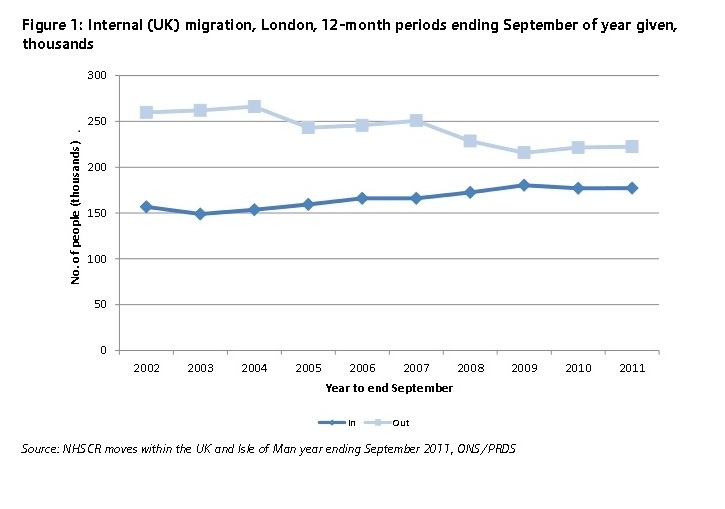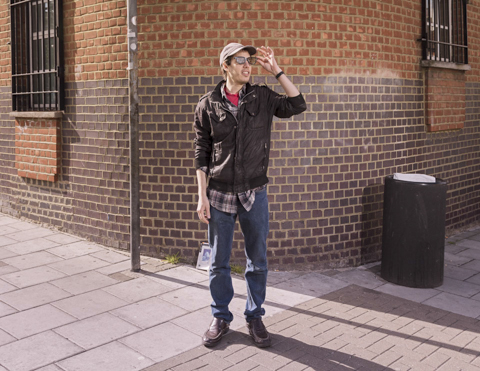
Number of people sleeping rough doubles in London
The number of people sleeping rough in London has more than doubled in the past five years, new figures have revealed.
Boris Johnson promised to end rough sleeping by 2012.
However, the latest report by charity Broadway, shows that rough sleeping actually went up by 43% in 2011/12 and has gone up a further 13% in the past year.
6473 people were seen sleeping rough on the street last year compared to just 3472 in 2007/8.
The percentage of people sleeping more than one night on the streets, continues to go down.
In the last year 75% were seen sleeping rough just once, up from 70% the year before.
However the overall number of rough sleepers continues to rise.
One in ten of rough sleepers in London are former members of the armed services according to Broadway.
Around a third are from Eastern Europe.
The most common reasons given for being on the street are “relationship breakdown”, “eviction” and “seeking work.”
The Mayor has so far declined to set a new deadline for ending rough sleeping.
Green Party London Assembly Member Darren Johnson said today:
“The Mayor has helped more people off the streets, but he has failed to tackle the reasons why they end up there in the first place. In these tough times people need secure and affordable housing, especially if their life has taken a turn for the worse. But the Mayor has supported cuts to our welfare safety net, overlooked damaging cuts to homelessness services and opposed reforms to our insecure private rented sector. If he doesn’t change course, his aim of ending rough sleeping will remain a distant dream.”
20 Jun 2013
Trails and Ways - Como Te Vas
Emma Oppen and co. channel Spanish influences to create perfect summer soundtrack.
19 Jun 2013
Listen to Teenage Mothers’ debut EP
Stream a scintillating introductory set from the boisterous Melbournians.
18 Jun 2013
A Delirious Testament to Imagination
Singer-songwriter Victoria Hume turns near-death delirium into musical escapology.
17 Jun 2013
Mapped: The Dalston Years’ guide to getting laid in Dalston
The Dalstonist published today a useful guide to getting laid in Dalston by writer The Dalston Years. That’s a lot of Dalston.
Yet, at 1700 words, the Dalstonist isn’t really simply answering what the average East Londoner is asking: where?
As in all things London, it takes Snipe to simplify the complex. So here’s your Google map on where to get laid in Dalston. Your suggestions in the comments below.
View Mapped: guide to getting laid in Dalston in a full screen map
14 Jun 2013
Why we should welcome foreign migrants to London
James Kirkup has a post at the Telegraph simultaneously being accurate and trolling his own readers with the news that immigration is a net plus for the British economy.
Sample quote:
“…the OECD found that international migration is making a positive difference to Britain’s public finances. That is, the Government’s deficit is smaller than it would have been without the presence of immigrants in the UK.”
He has charts and so on, and is basically arguing with facts against the mindset which produces this:

I’d like to add a London specific graph into the mix.
This shows internal, UK movement in and out of London. If you grew up in, say, the North and moved to London for work in the last 10 years, you’re one of the “ins” on here. Likewise if you used to live in London but moved to a nice cottage on the South Downs to keep some bees, you’re one of the “outs”.

Source: london.gov.uk migration indicators June 2013 The numbers are based on people registering with new GPs, which shows when they are moving their lives somewhere else
What this neatly shows is that more people leave London for other parts of the UK each year than come in from those parts.
Then how can London grow? Partly because of all the people coming in from outside the UK.
Simplifying: economic migrants from inside the UK (like me), and economic migrants from outside the UK, both contribute to London’s growth. This makes it a better place to live.
14 Jun 2013
Autoheart - Agoraphobia
The band formerly known as The Gadsens beat themselves up with a giant loner-pop stick.
10 Jun 2013
One Minute With Jeffrey Lewis

Meeting Mark E. Smiths mum, playing in donut shops and learning “real” guitar solos: New York singer-songwriter Jeffrey Lewis played 5 shows, in 2 days, at the Brixton Windmill, where he spoke to Snipe.
What’s the strangest show you’ve done? I usually think of the time I played on top of a bathroom with Tony Green in a tiny place called Voodoo Donut in Portland Oregon. It has since moved to a larger location, but in the old location there was about a 3-foot crawl space between the roof of the bathroom and the ceiling, where the two of us hunched and passed a guitar back and forth. About 4 people could fit in the donut shop total, so sometimes we had a “crowd” of 3 or 4 people who were coming in to buy donuts and lingered for a song or two.
What songs, of yours, are you most proud of? I really like Heavy Heart, it says a lot in a very short time with a very few words. It was one of the earliest songs I wrote that I still play, I don’t think I could write something like that again. I’m also very proud of the French Revolution piece (a spoken-word film & comic book work) – it seemed impossible to do at first, but I worked very hard on it and I ended up with a really good one.
Who is the most famous or surprising person to come to a Jeffrey Lewis show? Mark E. Smith’s mom was at our gig in London when we opened for the Fall in 2004 or 2005, we chatted to her a bit before the show.
What singers inspired you when you started? What ones still do? When I started in the late 90s I was heavily into Pearls Before Swine records, so I admired that kind of sparse delivery of music and vocals from Tom Rapp; I was also very inspired by Daniel Johnston of course for his directness, and Ira Kaplan of Yo La Tengo, also for a very direct and natural sounding delivery. I’ve widened my range and interests since then, but I’m still drawn to that sort of disarming, informal, conversational singing. Lou Reed is certainly an all-time idol, I have every album he’s ever made. I like when someone’s voice is not a barrier between singer and listener, but a direct conduit, without any fancy stuff blocking up the works.
What songs and lyrics impress you? The Seventh Seal by Scott Walker and The Ballad of Tom Joad by Woody Guthrie are two of my favorite songs, and both were based on movies, which is strange. Both songs are, to me, better than the films they were based on (though both are good films too). For impressive lyrics I just heard this amazing Eminem line: “I’m gonna introduce you to my power tools/ You know the drill…”
What musically have you learnt recently that surprised you? That I can play a bit more of a “real” guitar solo than I thought, not much better than any 15 year old who plays guitar solos with friends in a basement, but I have learned that after about 12 years of doing this I can now actually play a guitar solo that is made out of notes and not just noises.
You wrote your literary thesis on Alan Moore’s “The Watchmen”. How was that, and did you like the film? I had a few different things to focus on, rather than one overall focus, and I keep re-writing and re-editing the whole thing, eventually I hope to have it available in some form. I thought the film could have been a lot worse, obviously Watchmen is one of the greatest comic books of all time and the film is far from being one of the greatest. But it was the best anybody’s done so far in attempting to adapt any of Alan Moore’s books to the screen, which is a questionable activity in the first place.
What you do love and hate most about London? I love the smells everywhere, but I hate the stupid design of the public transportation; riders on the tube practically have their knees touching the person across from them, there’s really no room for people with luggage or baby strollers.
What’s next for Jeffrey Lewis? Can you recommend something for us? The great new album “Hey Hey it’s… The Jeffrey Lewis & Peter Stampfel Band”! I’m quite happy with it.
Jeffrey Lewis is great.: Go see him and buy his records.
All images copyright Gavin Mecaniques
10 Jun 2013
Fuck Buttons - The Red Wing (edit)
Benjamin John Power and Andrew Hung return with an uncharacteristically ‘concise’ banger.
04 Jun 2013

Traffic rising across London after decade long fall
Traffic in London is now rising, reversing a decade long decline across the city, Boris Johnson has said.
Traffic had fallen by over ten per cent since the mayoralty was first set up thirteen years ago.
Car ownership had also fallen, bucking the national trend and making London the only region in the UK with fewer cars than households.
However, Boris Johnson now expects traffic to rise by up to 3% by 2018.
He told Green Party London Assembly Member Darren Johnson in a recent written answer that:
“TfL expects traffic in central, inner and outer London to grow by up to 2 per cent, 3 per cent and 2 per cent respectively. The figures indicate growth in vehicle kilometres on a typical midweek day.”
The Mayor has since written to Johnson to confirm that traffic is already starting to rise in London. He told him
“In terms of observed traffic volumes, the trend was downwards until 2011/12. More recent data for 2012/13 however suggest a small increase (c.1 per cent) on the previous year.”
Darren Johnson today called on the Mayor to stop “giving priority to cars”:
“London is the only major city in the world where traffic has reduced, as its population has risen rapidly. Less traffic has meant less pollution and car ownership has declined as people have made different lifestyle choices. The Mayor is in danger of reversing this huge achievement of the last decade by forcing up fares above inflation, giving priority to cars on the roads and creating a more dangerous environment for pedestrians and cyclists. The Mayor should abandon the above inflation fare rises, junk the dangerous ideas for smoothing traffic flow and focus on making cycling safer for everyone.”
Since Boris Johnson was elected he has re-phased traffic lights to favour traffic, raised fares above inflation every year and removed the western extension of the congestion charge. He also plans to spend billions on new East Thames road crossings.
However, TfL now admit that his flagship policy of “smoothing the traffic flow” has so far failed to have any effect.
In fact according to the latest Travel in London report, the percentage of road trips completed within the expected journey time has actually fallen slightly over the past few years.
TfL accept that the longer term trend is basically “stable”. In other words there has been no traffic smoothing at all.
London’s shift away from cars towards public transport is arguably the biggest achievement of the London Mayoralty.
Reversing that trend could could end up being Boris Johnson’s biggest legacy as well.
04 Jun 2013
Snipe Highlights
Some popular articles from past years
- An interview with Desiree Akhavan
- Number of people using Thames cable car plunges
- Hope and despair in Woolwich town centre
- Random Interview: Eileen Conn, co-ordinator of Peckham Vision
- London has chosen its mayor, but why can’t it choose its own media?
- Peter Bayley has worked for 50 years as a cinema projectionist in East Finchley
- Silencing the Brick Lane curry touts could be fatal for the city's self-esteem
- A unique collection of photos of Edwardian Londoners
- The five spookiest abandoned London hospitals
- Nice Interactive timeline lets you follow Londoners' historic fight against racism
© 2009-2025 Snipe London.
